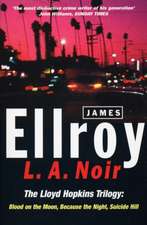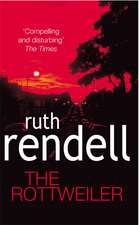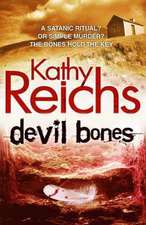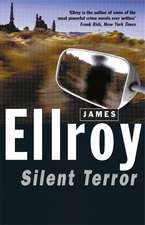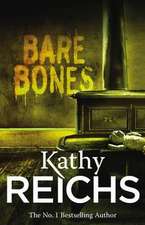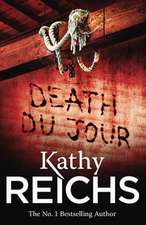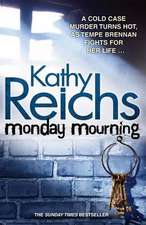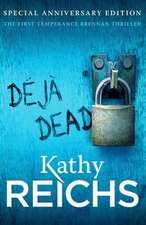206 Bones: Temperance Brennan
Autor Kathy Reichsen Limba Engleză Paperback – 13 mai 2010
| Toate formatele și edițiile | Preț | Express |
|---|---|---|
| Paperback (2) | 54.18 lei 24-35 zile | +20.79 lei 7-11 zile |
| CORNERSTONE – 13 mai 2010 | 54.18 lei 24-35 zile | +20.79 lei 7-11 zile |
| Simon&Schuster – 31 mai 2010 | 61.41 lei 3-5 săpt. |
Preț: 54.18 lei
Preț vechi: 64.02 lei
-15% Nou
Puncte Express: 81
Preț estimativ în valută:
10.37€ • 10.71$ • 8.63£
10.37€ • 10.71$ • 8.63£
Carte disponibilă
Livrare economică 07-18 martie
Livrare express 18-22 februarie pentru 30.78 lei
Preluare comenzi: 021 569.72.76
Specificații
ISBN-13: 9780099492382
ISBN-10: 0099492385
Pagini: 400
Dimensiuni: 132 x 195 x 28 mm
Greutate: 0.27 kg
Editura: CORNERSTONE
Seria Temperance Brennan
Locul publicării:United Kingdom
ISBN-10: 0099492385
Pagini: 400
Dimensiuni: 132 x 195 x 28 mm
Greutate: 0.27 kg
Editura: CORNERSTONE
Seria Temperance Brennan
Locul publicării:United Kingdom
Extras
1
Cold.Numb.
Confused.
I opened my eyes.
To dark. Black as arctic winter.
Am I dead?
Obeying some limbic command, I inhaled deeply.
Smells registered in my brain.
Mold. Musty earth. Something organic, hinting at the passage of time.
Was this hell? A tomb?
I listened.
Silence. Impenetrable.
But no. There were sounds. Air moving through my nostrils. Blood pounding in my ears.
Corpses don't breathe. Dead hearts don't beat.
Other sensations intruded. Hardness below me. Burning on the right side of my face.
I raised my head.
Bitter bile flooded my mouth.
I shifted my hips to relieve pressure on my twisted neck.
Pain exploded up my left leg.
A groan shattered the stillness.
Instinctively, my body went fetal. The pounding gained volume.
I lay curled, listening to the rhythm of my fear.
Then, recognition. The sound had come from my own throat.
I feel pain. I react. I am alive.
But where?
Spitting bile, I tried reaching out. Felt resistance. Realized my wrists were bound.
I flexed a knee toward my chest, testing. My feet rose as one. My wrists dropped.
I tried a second time, harder. Neurons again fired up my leg.
Stifling another cry, I struggled to force order onto my addled thinking.
I'd been bound, hands to feet, and abandoned. Where? When? By whom? Why?
A memory search for recent events came up empty. No. The void in recollection was longer than that.
I remembered picnicking with my daughter, Katy. But that was summer. The frigid temperature now suggested that it must be winter.
Sadness. A last farewell to Andrew Ryan. That was October. Had I seen him again?
A bright red sweater at Christmas. This Christmas? I had no idea.
Disoriented, I groped for any detail from the past few days. Nothing stayed in focus.
Vague impressions lacking rational form or sequence appeared and faded. A figure emerging from shadow. Man or woman? Anger. Shouting. About what? At whom?
Melting snow. Light winking off glass. The dark maw of a cracked door.
Dilated vessels pounded inside my skull. Hard as I tried, I could not evoke recollection from my semiconscious mind.
Had I been drugged? Suffered a blow to the head?
How bad was my leg? If I managed to free myself, could I walk? Crawl?
My hands were numb, my fingers useless. I tried tugging my wrists outward. Felt no give in my bindings.
Tears of frustration burned the backs of my lids.
No crying!
Clamping my jaw, I rolled to my back, raised my feet, and jerked my ankles apart. Flames roared up my left lower limb.
Then I knew nothing.
I awoke. Moments later? Hours? No way to tell. My mouth felt drier, my lips more parched. The pain in my leg had receded to a dull ache.
Though I gave my pupils time, they took in nothing. How could they adjust? The dense blackness offered not a sliver of light.
The same questions flooded back. Where? Why? Who?
Clearly, I'd been abducted. To be the victim in some sick game? To be removed as a threat?
The thought triggered my first clear memory. An autopsy photo. A corpse, charred and twisted, jaws agape in a final agonal scream.
Then a kaleidoscope sequence, image chasing image. Two morgues. Two autopsy rooms. Name plaques marking two labs. Temperance Brennan, Forensic Anthropologist. Temperance Brennan, Anthropologue Judiciaire.
Was I in Charlotte? Montreal? Far too cold for North Carolina. Even in winter. Was it winter? Was I in Quebec?
Had I been grabbed at home? On the street? In my car? Outside the Édifice Wilfrid-Derome? Inside the lab?
Was my captor a random predator and I a random victim? Had I been targeted because of who I am? Revenge sought by a former accused? By a conspiracy-theorist next of kin? What case had I last been working?
Dear God, could it really be so cold? So dark? So still?
Why that smell, so disturbingly familiar?
As before, I tried wriggling my hands. My feet. To no avail. I was hog-tied, unable even to sit.
"Help! I'm here! Someone! Help me!"
Over and over I called out until my throat grew raw.
"Anyone! Please!"
My pleas went unanswered.
Panic threatened to overwhelm me.
You will not die helpless!
Trembling from cold and fear, and frantic to see, I shifted to my back and started bucking my hips, stretching my hands upward as far as possible, oblivious to the agony in my leg. One thrust. Two. Three. My fingertips scraped hardness little more than a foot above my face.
I lunged again. Made contact. Sediment cascaded into my eyes and mouth.
Spitting and blinking, I rolled onto my right side and shoved backward with one arm and both feet. The rough ground abraded the skin on my elbow and heels. One ankle screamed in protest. I didn't care. I had to move. Had to get out.
I'd advanced a very short distance when I encountered a wall. Rectangular contours surrounded by mortar. Brick.
Heart hammering, I rolled to my other side and inched in the opposite direction. Again, I soon hit a wall.
Adrenaline flooded my body as terror piggybacked onto terror. My gut curdled. My lungs drew great heaving breaths.
My prison was no more than thirty inches high and six feet wide! Its length didn't matter. Already I felt the walls pressing in.
I lost control.
Scooching forward, I began yelling and beating the brick with my fists. Tears streamed down my cheeks. Over and over I called out, hoping to attract the attention of a passerby. A worker. A dog. Anyone.
When my knuckles grew raw I attacked with the heels of my hands.
When I could no longer flail with my arms, I rolled and lashed out with my feet.
Pain ripped from my ankle. Too much pain. My calls for help morphed into agonized moans.
Defeated, I fell back, panting, sweat cooling on my icy flesh.
A parade of faces marched through my mind. Katy. Ryan. My sister, Harry. My cat, Birdie. My ex-husband, Pete.
Would I never see them again?
Great heaving sobs racked my chest.
Perhaps I lost consciousness. Perhaps not. My next awareness was of sound.
A noise outside my body. Not of my making.
I froze.
Tick. Tick. Tick. Tick. Tick.
A cerebral crack opened.
Memory slipped through.
Copyright © 2009 by Temperance Brennan, L.P.
2
Another wristwatch check. Another sigh. More shifting feet.Above us, a wall clock ticked steadily, indifferent to Ryan's restlessness. It was the old-fashioned analog kind, round, with a sweep second hand that jumped in one-second increments with sharp little clicks.
I surveyed my surroundings. Same plastic plant. Same bad print of a street scene in winter. Same half-empty mugs of tepid coffee. Phone. LCD projector. Screen. Laser pointer. Nothing new had magically appeared since I last looked.
Back to the clock. A logo identified the manufacturer as Enterprise. Or perhaps that was a name for this particular model.
Did people christen timepieces? Arnie Analog? Reggie Regulator?
OK. I was as edgy as Ryan. And very, very bored.
Tick. Tick. Tick. Tick. Tick.
Old Enterprise said it was ten twenty-two. Oh-six. Oh-seven. Oh-eight. We'd been waiting since nine o'clock.
Finger-drumming recommenced on the tabletop. Ryan had been performing off and on for thirty minutes. The staccato beat was getting on my nerves.
"He'll meet with us as soon as he can," I said.
"Our coming here was his idea."
"Yes."
"How do you lose a stiff in a morgue?"
"You heard Corcoran. They've got over two hundred bodies. The facility is overstretched."
While I have been described as impatient, Lieutenant-détective Andrew Ryan, Section des crimes contre la personne, Sûreté du Québec, takes the term to a whole new plane. I knew the routine. Soon he'd be pacing.
Ryan and I were in a conference room at the Office of the Cook County Medical Examiner, on Chicago's West Side. We'd flown from Montreal at the request of Christopher Corcoran, a staff pathologist with the CCME.
More than three years earlier, a fifty-nine-year-old woman named Rose Jurmain had taken a trip from Chicago to Quebec to view the fall foliage. On the fourth day of her visit she'd left her country inn for a walk and never returned. Her belongings remained behind in her room. No one saw or heard from her again.
Thirty months later remains were discovered in a forested area half a mile north of the inn. Decomposition was advanced and animal damage was extensive. I'd done the ID. Ryan had led the investigation. Now he and I were bringing Rose home.
Why the personal service? For me, friendship with Corcoran and an excuse to visit the old hometown. For Ryan? A free trip to the Windy City.
For Chris Corcoran and his boss? That would be one of my very first questions. Surely a CCME employee could have come to Montreal to collect the remains. Or a transport service. Until now the family had shown no interest in what was left of Rose Jurmain.
And why the request for our presence in Chicago nine months after resolution of the case? The Bureau du coroner had ruled Rose's death an accident. Why the special interest now?
Despite my curiosity, so far there'd been no time for questions. Ryan and I had arrived to find media vans lining Harrison Street and the facility in lockdown.
While parking us in the conference room, Corcoran had provided a quick explanation. The previous day, a funeral home had attempted to collect a body for cremation. Inexplicably, the corpse was nowhere to be found.
All hands were engaged in crisis control. The chief was spinning for the press. A frantic search was under way. And Ryan and I were cooling our heels.
"I suppose the family is going ballistic," Ryan said.
"Oooh, yeah. And the media is loving it. Lost bodies. Shocked loved ones. Embarrassed politico. It's the stuff of Pulitzers."
I'm a news junkie. At home I read, or at least skim, each day's paper from front to back. On the road, I tune in to CNN or a local station. Earlier, in my hotel room, I'd flipped between WFLD and WGN. Though aware of the story, I'd not anticipated the resulting chaos. Or the impact on us.
Sure enough, Ryan got up and began pacing the room. I checked my pal Enterprise. Inspector Irritable was right on schedule.
After logging roughly thirty yards, Ryan dropped back into his chair.
"Who was Cook?"
I was lost.
"Cook County?"
"No idea," I said.
"How big is it?"
"The county?"
"My aunt Dora's fanny."
"You have an aunt Dora?"
"Three."
I stored that bit of familial trivia for future query.
"Cook is the second most populous county in the U.S., the nineteenth largest government in the nation." I'd read those facts someplace.
"What's the largest?"
"Do I look like an almanac?"
"Atlas."
"Some almanacs contain census data." Defensive. After the trip from Montreal, I was no longer in the mood for teasing.
Though generally cheerful, Ryan is not a good traveler, even when the aviation gods are smiling. Yesterday they'd been grumpy as hell.
Instead of two hours, our flight from Pierre-Elliot Trudeau International to O'Hare had taken six. First a weather delay. Then a mechanical complication. Then the crew went illegal for dancing naked on the tarmac. Or some such. Annoyed and frustrated, Ryan had passed the time nitpicking everything I said. His idea of jolly good banter.
Several moments passed.
Tick. Tick. Tick. Tick. Tick.
Ryan was pushing to his feet when the door opened and Christopher Corcoran entered, dressed in lab coat, jeans, and sneakers. With his pale skin, green eyes, red hair, and freckles, Corcoran was a walking Irish cliché. And decidedly nervous.
"I'm really sorry for the delay. This missing body thing turned into an Italian opera."
"I hate it when corpses go walkabout." The old Ryan wit.
Corcoran gave a mirthless smile. "Especially when the decedent's under your care."
"It was your case?" I asked.
Corcoran nodded. As I looked at him, a million memories flooded my mind. A scrawny kid, all spindly limbs and wild carrot hair. Wrought-iron desks floor-bolted in long straight rows. Impromptu street games on hot summer nights. Interminable Masses on hard wooden pews.
As kids, Corcoran and I were back-fence neighbors in a South Side neighborhood called Beverly, and card-carrying members at St. Margaret's of Scotland. Keep in mind that Chicago Catholics map people by parishes, not geography. An oddity, but there you have it.
When I was eight, my father and baby brother died, and my family relocated to North Carolina. Corcoran stayed put. We lost touch, of course. I grew up, attended the University of Illinois, then graduate school at Northwestern. He studied at Michigan, undergrad through med school, then completed specialty training in pathology. It was forensics that brought us back into contact.
Reconnection occurred in '92 through a case involving a baby in a suitcase. By then Corcoran had married, returned to Chicago, and purchased a house on Longwood Drive. Though a little farther east and a lot upmarket, Corcoran had returned to the old spawning ground.
"Turns out it was here all along." Corcoran's voice brought me back. "The guy was so scrawny he got hidden behind an obese woman on an upper gurney shelf. The techs just missed him."
"Happy ending," Ryan said.
Corcoran snorted. "Tell that to Walczak."
It was said of Stanley Walczak that only his ego surpassed his ambition in raw tonnage. His cunning was fierce too. Upon the resignation of the previous ME nine months earlier, having forged a complex web of political connections, to the surprise of few, and the dismay of many, Walczak had called in his chits and been appointed Cook County Medical Examiner.
"Walczak is pissed?" I asked.
"The man detests bad publicity. And inefficiency." Corcoran sighed. "We handle roughly twenty pickups a day here. Between yesterday and this morning the staff had to phone over sixty funeral homes to see if a delivery had been made to the wrong place. Four techs and three investigators had to be pulled off their normal duties to help check toe tags. It took three sweeps to finally locate the guy. Hell, we've got half a cooler set aside just for long-term unknowns."
"Mistakes happen." I tried to sound encouraging.
"Here, misplacing a body is not considered a career-enhancing move."
"You're a fantastic pathologist. Walczak's lucky to have you."
"In his view, I should have been on top of the situation sooner."
"You expect fallout?" Ryan asked.
"The family's probably lawyer-shopping as we speak. Nothing like a few bucks to assuage unbearable anguish, even when there is no injury. It's the American way."
Corcoran circled the table and we all sat.
"Walczak says he won't be long. He's closeted with the Jurmain family lawyer. You're gonna love him."
"Oh?"
"Perry Schechter's a Chicago legend. I once heard him interviewed. Explained his style as confrontational. Said being abrasive knocks people off their stride, causes them to reveal flaws."
"Character flaws? Testimonial flaws?"
"Beats me. All I know is the guy's a pit bull."
I looked at Ryan. He shrugged. Whatever.
"Before they arrive," I said. "Why are we here?"
Again, the mirthless smile. "Ever eat a Moo-Moo Bar or a Cluck-Cluck Pie?"
When Harry and I were kids, Mama had packed dozens of the little pastries into our lunches. Though uncertain of the relevance, I nodded recognition.
Ryan looked lost.
"Think Vachon," I translated into Québécois. "Jos. Louis. May West. Doigts de Dame."
"Snack cakes," he said.
"Thirteen varieties," Corcoran said. "Baked and sold by Smiling J Foods for two generations."
"Are they still available?" I couldn't remember seeing the little goodies in years.
Corcoran nodded. "Under new names."
"Quite a slap in the face to our barnyard friends."
Corcoran almost managed a genuine grin. "The J in Smiling J stood for Jurmain. The family sold out to a conglomerate in 1972. For twenty-one million dollars. Not that they needed the cash. They were bucks-up already."
I began to get the picture.
So did Ryan.
"Family fortune spells political clout," I said.
"Mucho."
"Thus the kid gloves."
"Thus."
"I don't get it. The case was closed over nine months ago. The Jurmain family got a full report but never responded. Though the coroner sent registered letters, until now no one has shown any interest in claiming the remains."
"I'll do my best to summarize a long but hardly original story."
Corcoran looked to the ceiling, as though organizing his thoughts. Then he began.
"The Jurmain family is blue-blood Chicago. Not ancient, but old enough money. Home in East Winnetka. Indian Hills Country Club. First-name basis with the governor, senators, congressmen. North Shore Country Day, then Ivy League schools for the kids. Get the picture?"
Ryan and I indicated understanding.
"Rose's father is the current patriarch, a sorry old bastard named Edward Allen. Not Ed. Not Al. Not E. A. Edward Allen. Rose was a black sheep, throughout her life refusing to follow any course Edward Allen deemed suitable. In 1968, instead of making her debut, she made the Tribune for assaulting a cop at the Democratic National Convention. Instead of enrolling at Smith or Vassar, she went off to Hollywood to become a star. Instead of marrying, she chose a lesbian lifestyle.
"When Rose turned thirty, Edward Allen pulled the plug. Deleted her from his will and forbade the family to have any contact."
"Until she saw the light," I guessed.
"Exactly. But that wasn't Rose's style. Thumbing her nose at Daddy, she chose to live on a small trust fund provided by Grandpa. Money Edward Allen was unable to touch."
"A real free spirit," I said.
"Yes. But things weren't all sunshine and poppies. According to her partner, Janice Spitz, at the time of her disappearance, Rose was depressed and suffering from chronic insomnia. She was also drinking a lot."
"That clicks with what we learned," Ryan said.
"Did Spitz think she was suicidal?" I asked.
"If so, she never said."
"So what gives?" I asked. "Why the sudden interest?"
"Two weeks ago, Edward Allen received an anonymous call at his home."
Corcoran was always a blusher, did so often and deeply when embarrassed or anxious. He did so now.
"Concerning Rose's death?" I asked.
Corcoran nodded, avoiding my eyes. I felt the first stirrings of uneasiness.
"What did this anonymous tipster say?"
"Walczak didn't share that information with me. All I know is I was tasked with overseeing a review of the case from this end."
"Tabarnouche." Ryan slumped back in disgust.
I could think of nothing to say.
Tick. Tick. Tick. Tick. Tick.
Corcoran broke the silence.
"Edward Allen is now eighty-one years old and in failing health. Perhaps he feels like a schmuck for having driven Rose from his life. Perhaps he's still the same controlling sonovabitch he always was. Perhaps he's nuts. What I do know is that Jurmain called his lawyer. The lawyer called Walczak. And here we are."
"Jurmain thinks the case was mishandled?" I asked.
Corcoran nodded, gaze locked on the tabletop.
"Walczak shares that belief?"
"Yes."
"Mishandled by whom?" It came out sharper than I meant.
Corcoran's eyes came up and met mine. In them I saw genuine distress.
"Look, Tempe, this is not my doing."
I took a calming breath. Repeated my question.
"Mishandled by whom, Chris?"
"By you."
Copyright © 2009 by Temperance Brennan, L.P
















